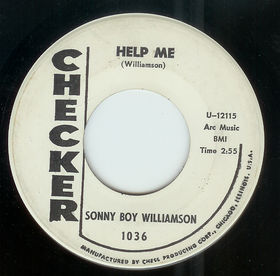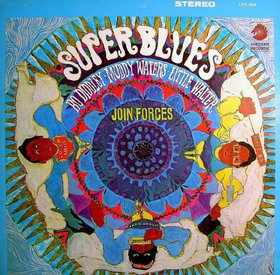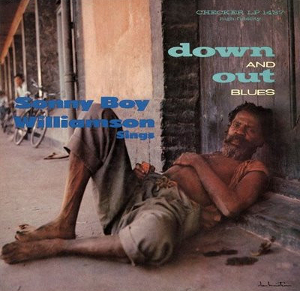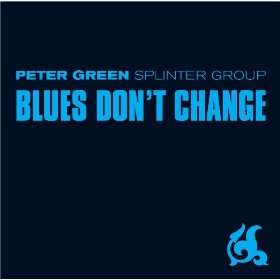
Alex or Aleck Miller, known later in his career as Sonny Boy Williamson, was an American blues harmonica player, singer and songwriter. He was an early and influential blues harp stylist who recorded successfully in the 1950s and 1960s. Miller used various names, including Rice Miller and Little Boy Blue, before calling himself Sonny Boy Williamson, which was also the name of a popular Chicago blues singer and harmonica player. To distinguish the two, Miller has been referred to as Sonny Boy Williamson II.

"Bring It On Home" is a blues song written by American music arranger and songwriter Willie Dixon. Sonny Boy Williamson II recorded it in 1963, but the song was not released until 1966. Led Zeppelin adapted it in part as a homage to Williamson in 1969 and subsequently, the song has been recorded by several artists.

Crusade is the fourth album and third studio album by the British blues rock band John Mayall & the Bluesbreakers, released on 1 September 1967 on Decca Records. It was the follow-up to A Hard Road, also released in 1967. As with their two previous albums, Crusade was produced by Mike Vernon. The album was the first recordings of the then-18-year-old guitarist Mick Taylor.

Johnny Winter is Johnny Winter's second studio album. Columbia Records released the album in 1969, after signing Winter to the label for a reported $600,000. As with his first album, The Progressive Blues Experiment, Winter mixes some original compositions with songs originally recorded by blues artists. The album reached number 24 on the Billboard 200 albums chart.

An Introduction to The Moody Blues is a compilation album by the early Moody Blues, led by Denny Laine. It includes all songs from The Magnificent Moodies except "True Story" and "Thank You Baby", but contains other early singles, as well as "People Gotta Go", which was only included on a rare French-only EP.

Sonny Boy Williamson & the Yardbirds is a live album by Chicago blues veteran Sonny Boy Williamson II backed by English rock band the Yardbirds. It was recorded at the Crawdaddy Club in Richmond, Surrey on December 8, 1963. However, the performances were not released until early 1966, after a string of Top 40 hits by the Yardbirds.
"One Way Out" is a blues song that was recorded in the early 1960s by both Sonny Boy Williamson II and Elmore James. A reworking of the song by G. L. Crockett, titled "It's a Man Down Here", appeared on the Billboard record charts in 1965. In 1971, the Allman Brothers Band recorded an updated live version of the song, which was included on their popular Eat a Peach album (1972).

"Help Me" is a blues standard first recorded by Sonny Boy Williamson II in 1963. The song, a mid-tempo twelve-bar blues, is credited to Williamson, Willie Dixon, and Ralph Bass and is based on the 1962 instrumental hit "Green Onions" by Booker T. and the MGs. "Help Me" became a hit in 1963 and reached number 24 in the Billboard R&B chart.

His Best is a 1997 greatest hits compilation album by American rock and roll icon Bo Diddley released by Chess and MCA Records on April 8, 1997. The album was re-released by Geffen Records on April 17, 2007 as The Definitive Collection with a different album cover. The Definitive Collection reached #2 on Billboard magazine's Blues Albums chart on June 21, 2008, which was the week that the album debuted on the charts.

His Best is a greatest hits album by Chicago blues harmonica player Little Walter, released on June 17, 1997 by MCA and Chess Records as a part of The Chess 50th Anniversary Collection. The album is seen as the CD successor to the 1958 The Best of Little Walter and features ten of the songs from that album.

Super Blues is a 1967 studio album by a blues supergroup consisting of Bo Diddley, Muddy Waters, and Little Walter. The album was released in both mono and stereo formats by Checker Records in June 1967. A follow-up album The Super Super Blues Band was released later that year and featured Howlin' Wolf replacing Little Walter.

Blues to the Bone is the twenty-seventh studio album by Etta James. The album contains a selection of twelve blues standards which are among her favourites. James and her sons Donto and Sametto James produced the album with Josh Sklair, which reached number four in the Billboard Top Blues chart.

"Don't Start Me Talkin'" is a blues song written and performed by Sonny Boy Williamson II. It was Williamson's first single recorded for Checker Records, and reached number three in the US Billboard R&B chart in 1955.

Down and Out Blues is the first LP record by American blues musician Sonny Boy Williamson. The album was released in 1959 by Checker Records.

His Best is a greatest hits album by American blues musician Howlin' Wolf. The album was originally released on April 8, 1997, by MCA/Chess Records, and was one of a series of releases by MCA for the 50th anniversary of Chess Records that year. Ten years later – on April 17, 2007 – the album was reissued by Geffen Records as The Definitive Collection.

"I Can't Hold Out", also known as "Talk to Me Baby", is a blues song written by Willie Dixon and recorded by Elmore James in 1960 for the Chess label. Called a classic and a "popular James standard", it has been interpreted and recorded by several artists.

Thru the Years is a compilation album of music by John Mayall released in October 1971 by Decca Records in the U.K. and London Records in the U.S.A. The album was the second compilation to be issued by Decca/London with Mayall's blessing, although his contract with them had ceased. It features a mixture of previously unissued songs or non-album tracks that had only been released as singles.

Blues Don't Change is an album by the British blues band the Peter Green Splinter Group, led by Peter Green. Originally released in 2001 and only available at concerts or via the band's official website, this was their seventh album. It was later given a full release on 3 April 2006, and again in 2012. Green was the founder of Fleetwood Mac and a member of that group from 1967 to 1970, before a sporadic solo career during the late 1970s and early 1980s.
"Bye Bye Bird" is a harmonica-driven blues song written by Willie Dixon and Sonny Boy Williamson II. In 1963, Checker Records issued it as the B-side of Williamson's single "Help Me", which was his last single to reach the record charts.

The Real Folk Blues is an album by blues musician Sonny Boy Williamson II compiling songs recorded in Chicago between 1957 and 1964. Released by Chess Records in 1966, the album contains mostly previously unissued material, including "Checkin' Up on My Baby" and "Bring It On Home", which have been called "some of the most accomplished masterpieces of postwar blues".


















